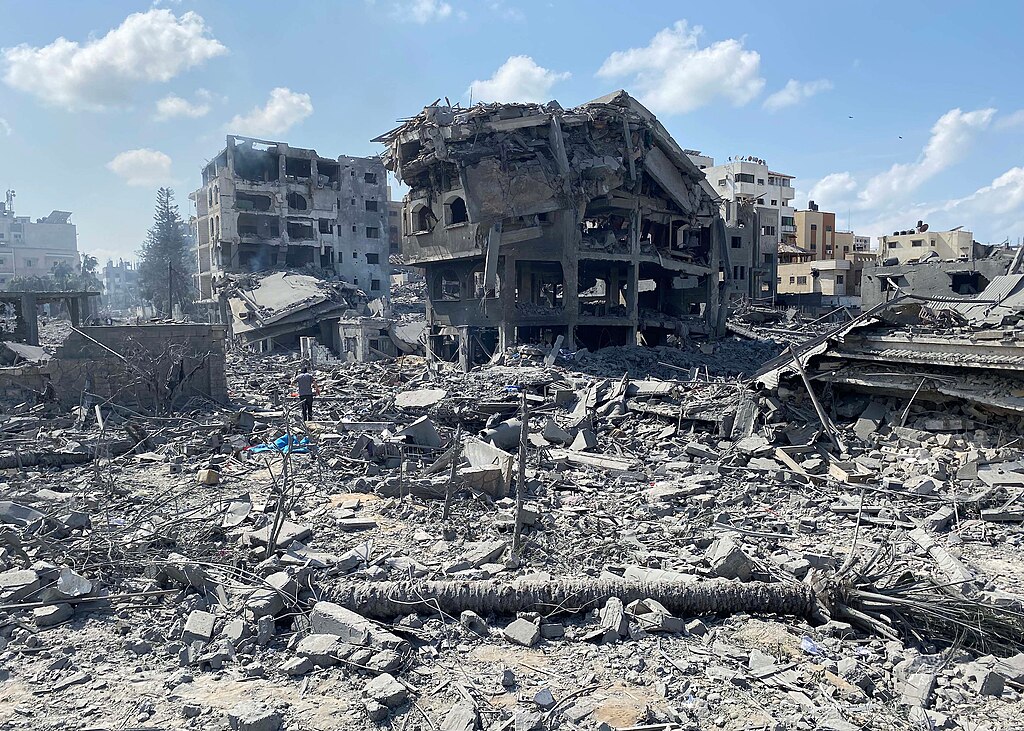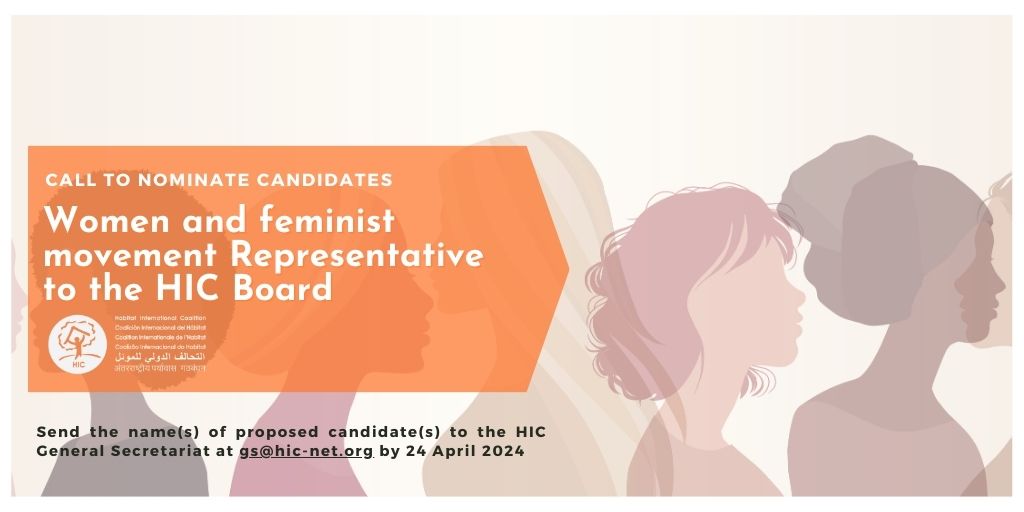A medida que la emergencia del COVID-19 golpea a África, HIC organizó una reunión virtual con todos los Miembros de la región para establecer un espacio para el aprendizaje y la acción colectiva. En la reunión, los Miembros de HIC expresaron sus preocupaciones y experiencias, así como las medidas que ya se están adoptando en sus países. La reunión también sirvió para escuchar las necesidades de los Miembros y la forma en que la Coalición podía apoyar sus esfuerzos nacionales y regionales.
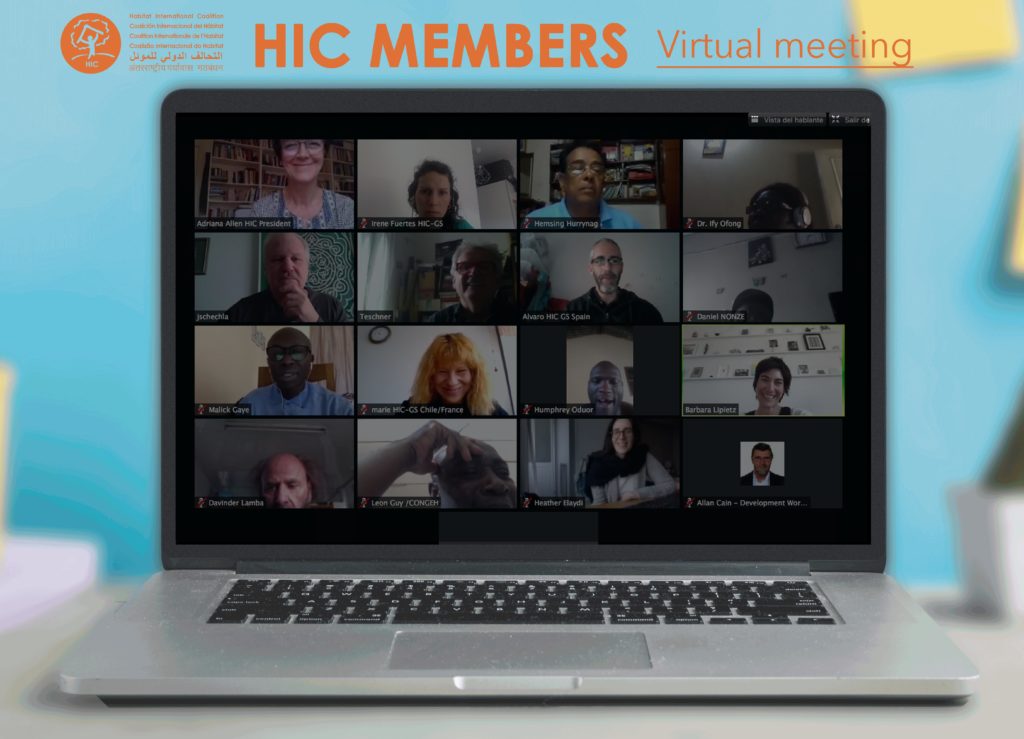
Información disponible en inglés
To learn more on the recommendations made by HIC please read the following links:
HIC Statement: COVID-19 We need a Human Rights Habitat: English / French
HIC Website dedicated page to HIC Members activities and initiatives facing COVID-19: English / French
Allan Cain / Development Workshop (DW) / Angola

Allan Cain reported that Angola has been under lockdown for 12 days. This has been combined with the state of emergency. There’s a low number of confirmed cases and deaths but there’s a problem with health facilities and its capacity to cope with the crisis. Looks like the strong linkages with Portugal and China might have helped spread the virus.
Development Workshop (DW)’s staff is working from home and coordinating online with a local network of over 100 communities, the focus is on water supply in rural areas and slums around big cities. Sanitation is also critical, as both water and sanitation have an impact on local transmission. There’s also a strong work on training the local population on hygiene and basic measures to avoid contagion. DW had to change the objective of some projects to try to ensure basic goods for the local population (alcohol, gloves), develop a continued dissemination campaign and foster collaboration with local communities to monitor the situation and the spread of the disease.
Yves Jöel Zoffoun / ONG Bethesda / Benin
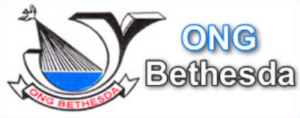
Yves Jöel Zoffoun started by remembering those infected and those who have died. He then resumed the figures in the continent, 10,000 cases in Africa so far and 480 deaths in the region. Yves highlighted that this is not a fiction but the reality, and how fragile we are and how we need the solidarity among us. He then thanked the HIC PR and the HIC GS for this exchange. The first registered case in Benin was on March the 16th. At the same time, a national commission was created in Benin with measures communicated to the population including, the closure of borders and quarantine for incoming travellers, closure of schools till May the 10th, confinement in big cities, where the main disease focus are, compulsory use of masks, suspension of public transport and limitations to the use of private cars, now limited to 4 people with masks. On the contrary markets and supermarkets are opened. ONG Bethesda has an extensive network of over 800 collaborators all over Benin. They are all promoting awareness about the illness and requesting people to work from home. Bethesda’s staff is complying with the organisational measures. As for the health system, hospitals are helping the communities and water and masks are distributed but there is not enough for everybody.
Armand Nouwe / Codas Caritas / Cameroon
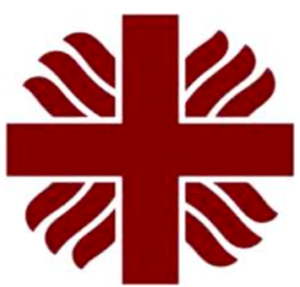
Armand Nouwe greeted the big HIC family and shared that the Codas Caritas Douala team is safe and doing OK. Cameroon registered cases since the beginning of March and now they have 750 cases confirmed with 10 deaths confirmed, unfortunately. The measures suggested by WHO were implemented and reinforced by the national Government including better hygiene and isolating the pupils and students. One of the challenges is that the economic situation does not allow for a general lockdown, besides guaranteeing access to essential needs is impossible with a general lockdown. There’s a concern of the economic impact of such a measure. On the other hand, the use of masks is compulsory, and there is a limit on the number of places in the public transport (bus, taxi, motorcycle-taxi). However, these measures lack a coordinated action plan in connection with decentralisation, with the aim of reaching people at the level of municipalities and neighbourhoods.
Other measures include the banning of public gatherings of more than 50 people.
Codas Caritas Douala has reoriented its social agenda to make everyone aware of the threat of COVID19 and to work and coordinate with associations the distribution of masks in certain markets in working-class neighbourhoods and handwashing devices in strategic places in the neighbourhoods in order to guarantee maximum safety.
Daniel Nonze, Lucas Tassi / Association des Amoureux du Livre (ASSOAL) / Cameroon

Daniel Nonze from ASSOAL agrees with the comments of Armand from Caritas Douala. He adds that the State of Cameroon has set up a programme to accompany the students during the confinement through radio and television. He pointed out that the only problem with this arrangement is that not all children have access to radio and electricity. He also reported that shops and bars are trained from 6 p.m. to 5 a.m. He added that mass screening campaigns are organized in some towns in the country. Daniel said that following the Government’s Response Strategy to the Coronavirus Pandemic (COVID-19) and the Special Declaration of the Prime Minister, Head of Government of 24th March 2020, the Chairman of the Executive Bureau (EB) and the General Coordinator of ASSOAL Programmes have taken interim measures relating to the containment of staff. A plan to ensure minimum service has been agreed upon. Members of the technical team work from their homes. Communication means, telephones and groups are used. The rest of the work is done from home, and exchanges between team members take place during this period through social networks, in particular the whatsapp groups created. Team meetings are held every Monday on the CGP whatsapp group from 9am to 11am. A commitment note was also produced and distributed by the association. A certain number of documents are produced and shared every Friday in prelude to the meeting and the participation of all is mandatory. They are as follows: Minutes of the last session by the monitoring-evaluation officer and follow-up of recommendations; Individual weekly report by each person; Synthesis of individual reports by the monitoring-evaluation officer; Plan of priority activities to be carried out for the new week by the project leader; Draft recommendations for the week.
With respect to our targets, WhatsApp groups have been created to facilitate the flow of information related to activities and the pandemic. A watsApp group has been created to allow members and partners to reflect on the impact of the pandemic on citizens now and in the future. Awareness campaigns are organised via the organization’s Call Centre. For these campaigns, the different databases of our targets and beneficiaries are used to send awareness SMS messages. Masks have been purchased and distributed to the volunteers and staff of the association. In perspective, theoretical and practical training of volunteers/facilitators on techniques for sensitizing and accompanying communities on the pandemic. To this end, gadgets such as caps, T-shirts, posters, flyers and stickers will be produced. Daniel thanks the group and hopes that this initiative will help everyone. Lucas Tassi thanked for the invitation and recommended that this initiative be continued. He stressed the importance of solidarity between the different organizations.
Dominique ESSONO / Réseau National des Habitants du Cameroun (RNHC) / Cameroon

Dominique Essono explained that the RNHC campaigns for decent housing for households (urban and rural) in Cameroon with a focus on land tenure security. This is achieved through a strategy of organizing the inhabitants of underprivileged neighbourhoods, victims and presumed victims of evictions and internally displaced persons around housing cooperatives. And so the RNHC works for the defence of the rights of vulnerable groups. Within the framework of COVID 19, the RNHC participated in the elaboration of a communiqué of the National Observatory of Economic, Social and Cultural Rights (ONDESC) which presents the actions that the ONDESC can carry out as part of the accompaniment of the measures of the State of Cameroon in the fight against COVID 19. These actions are essentially centred on:
– Raising awareness of the barrier measures against COVID 19;
– Raising awareness on the measures taken by the State to limit the spread of COVID (T-shirts, leaflets and posters have been produced for this awareness campaign);
– The distribution of some masks to the communities victims or presumed victims of the evictions;
– The distribution of washing material to IDPs (nationals from the North-West and South-West of Cameroon due to the prevailing Anglophone crisis) who are currently benefiting from temporary accommodation offered by some of the RNHC members;
– The use of social networks to broaden awareness;
– Suggestions to the Government to regulate access to certain basic social services in disadvantaged neighbourhoods;
– Consideration of the difficulties or consequences arising from the pandemic and affecting small businesses run by vulnerable and informal groups;
The RNHC relies on its regional focal points and its chain of contacts (a group of people who collect information on a daily basis on cases of housing rights violations in Cameroon) to make this action of the RNHC visible in all regions of Cameroon.
Unfortunately, the RNHC has pointed out that gender-based and domestic violence is worsening and needs to be addressed.
The RNHC also highlighted the need to stop evictions and attempted evictions during pandemics. Dominique thanked HIC for opening up this space for debate.
Franck Olivier Kouame / Humanitas Solidaris / Cameroon
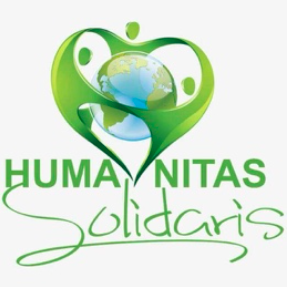
Franck Olivier Kouame sent his contribution after the meeting because he had internet problems, stated that the number of persons with Covid 19 is increasing daily and that Humanitas Solidaris is working on stimulating the population conscience awareness and education on the pandemic and seeking funds for the rehabilitation of the Nanga Eboko hospital in order to ensure quarantine and containment. The government measures are relating to hygiene rules, compulsory wearing of masks, and the closure of public places (bars, restaurants, etc.) during curfew starting at 6 pm. The organization recommends that the state should proceed with the free distribution of masks, and should provide water and bottles of hydro-alcohol in poor neighbourhoods in different towns and villages.
Davinder Lamba / Mazingira Institute / Kenya

Davinder Lamba explained that the Mazingira Institute helped draft a statement on Kenya’s reality requesting the cooperation of the Kenyan Government (available at https://www.hic-net.org/wp-content/uploads/2020/12/COVID-19-CRISIS-GROUP-STATEMENT.pdf); the problem is that they are not responsible themselves. The country contexts are very different and different options are being discussed, such as, should we save the children or everybody? On the other hand, the health infrastructure in Kenya is weak and that’s a major concern for citizenship, besides the insufficient number of test kits. Another major issue is the access to food and the need to shorten food chains as much as possible.
Davinder suggested that HIC should focus on the specific context of each HIC Member, given the diversity of situations and the complexity of the pandemia.
He also commented on the situation In Zimbabwe, where the government is dysfunctional and the private sector is taking that role and providing services to the population.
Adi Kumar / Development Action Group (DAG) / South Africa (Afrique du sud)
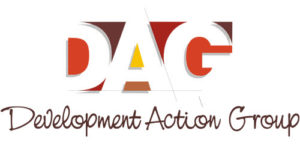
Adi Kumar from Development Action Group (DAG) explained that South Africa is in the 14th day of a 21-day lockdown. The focus has been the relief efforts coordinated through the presidency. The positive side has been the immense coordination between civil society, private sector and government institutions in relief efforts. There has been cross class collaboration. The main challenges currently are the delivery of basic services (water, sanitation etc) to informal settlements, food is becoming a huge concern if the lockdown continues for another 4 weeks; finally, the livelihood of formal and informal traders is at risk. Lastly, there have been instances of the police and military using brutal force for ensuring the lockdown in some poor neighbourhoods. DAG has been working remotely but connecting over 50 communities to relief efforts -from providing materials for fabricating masks, facilitating the delivery of food vouchers, locating water and sanitation services and all other relief efforts. DAG has also initiated a group of all civil society organisations in the province.
The largest worry in south Africa is that the National Minister of housing is pushing a de-densification strategy -which might involve mass relocations and displacement. As civil society organisations, they are trying to resist any short term, yet myopic response by ministers for political leverage.
Humphrey Otieno / Kenya Social Movement Network (KSM-Net) / Kenya
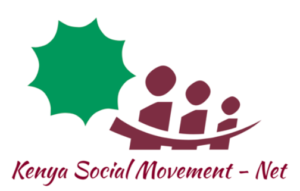
Humphrey Otieno from the Kenya Social Movement Network (KSM-Net) explained that the number of infections is low but prospects indicate it will raise. Kenya is under a curfew at the national level and lockdown in four counties to prevent people from moving outside their locations and spreading the disease.
KSM-Net has requested the Kenyan Government to provide water, in particular to informal settlements around Nairobi where the main focus is. With families locked, the cases of gender violence will increase, being this a major concern for KSM-Net. Keeping social distancing and addressing injustice, in particular, caused by police brutality is fundamental with KSM-Net monitoring these issues. Humphrey suggested that having a tool that monitors this in the region would be helpful.
Hemsing Hurrynag / Development Indian Ocean Network (DION) / Mauritius (Ile Maurice)
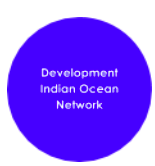
Hemsing Hurrynag from Development Indian Ocean Network (DION) explained that the confinement in Mauritius started at the beginning of March. Since then the government has tracked those suspected of being infected and quarantined them for two weeks. Luckily there was progress in the disease control. On the supply side, the supermarkets and markets have limited the access of the public. Following the restrictions imposed on all the population, CSOs are also in lockdown and this is limiting DION’s work.
Ifeyinwa Ofong / Worldwide Network / Nigeria
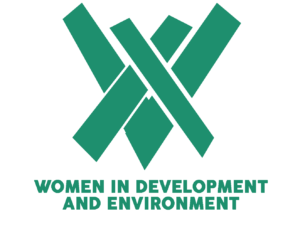
Ifeyinwa Ofong from Women in Development and Environment, Nigeria, said that there are not enough testing facilities to serve the huge population in Nigeria. Other concerns confronting the pandemic include lack of adequate water and sanitation facilities, particularly in rural and semi- urban areas. This may affect the constant hand washing required and giving the fact that hand sanitizers are very limited.
Social distancing is difficult to implement due to the way we and most Africans live. We are used to hugging and shaking of hands when exchanging greetings and pleasantries.
The economic impact of COVID- 19 is severe, as people were requested to stay at home and many are now working from home. This has affected food supply to families, as government’s intervention is not enough. Also affected most are the informal workers who constitute a large percentage of workers in Nigeria. Women in particular, have also been affected with a rise in violence against women. Many women are losing their source of livelihood and income due to the lockdown.
WorldWIDE Network as an organization is currently focusing on the communication and dissemination of information with rural communities, where the impact of the pandemics could be worse.
Ify recommends discussing how we can support HIC Members and rural communities which are the most affected. In urban areas, rules are enforced but there is limited support to rural populations.
Malick Gaye / ENDA RUP / Senegal
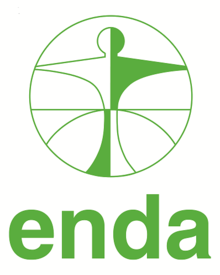
Malick Gaye said that it was time to pray for the world during the Ramadan. He thanked everybody, and especially Davinder, for this initiative. In his opinion, solidarity will be essential as well as regional coordination. On the other hand, we must think that environmental and ecological degradation are behind the crisis, hence the need to approach more sustainable models. In Senegal, the confinement is affecting the local population, in particular the most vulnerable sectors.
Although Africa is the least affected region, early precaution measures were taken in Senegal as barriers against the transmission of the virus. Above all, the partial confinement of population such as curfews at night and a state of emergency during the day by prohibiting inter-urban travel.
There are unfortunate consequences of these measures on the population and in particular on the large number of people who are economically, socially and environmentally vulnerable. This is affecting their income-generating economic activities, mainly in the informal sector, exacerbating their critical situation and their vulnerability. As for housing for tenants, this is something that the Government of Senegal has not taken into account, as the government has focused its efforts to assist the survival of vulnerable populations on access to food, energy, water and the health care sectors. In view of the emergency situation that will last 2 weeks at least, ENDA RUP is beginning to reflect on the post-pandemic in terms of sustainable development and in particular on the issue of food support, aiming at food self-sufficiency and land use planning. This would help officials and citizens understand the value of natural resources and the environment.
As the origin of the virus is also linked to the dominant economic development model and the market economy favouring multinational companies and enterprises, there are also proposals to change this trend in favour of regional integration such as the African Union and ECOWAS sub-regional integration, targeting West Africa. This would be done in coordination with other African sub-regions.
ENDA-RUP shared a first Declaration including with HIC, WUC-UNhabitat who requested it, as well as posters and barrier messages against Covid19 and we are currently revising the orientations of our programmes with the financial partners who support our actions in view of the COVID 19 situation.
Joseph Schechla / HIC Housing and Land Rights Network (HIC HLRN) / Egypt
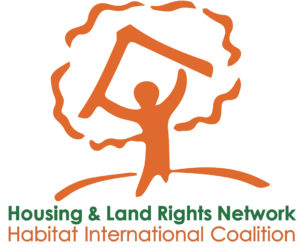
Joseph Schechla explained that the situation in Egypt is as serious as in other countries. He highlighted the importance of the Habitat approach and relevant cross cutting issues such as housing, health, governance and rights. He stressed the dramatic situation of refugees and people under occupation who are among the most vulnerable, their rights not being respected. Vulnerable prison populations shouldn’t be forgotten.
He gave some examples, including a case of racial discrimination in Tunisia, where 100 families from SSA Africa were evicted. They were labelled as ‘Africans’ by the media. He also explained that food sovereignty is also affected.
This crisis exemplifies the importance of a “habitat” approach that is coherent and integrated, as WHO has recently updated its findings on housing and health, but also the necessary way of thinking about all human rights together. This can be done with the more-coherent “habitat” approach. He then shared a couple of joint statements of HIC HLRN with the International Planning Committee on Food Sovereignty (Rome) on the importance of small-scale food producers in this crisis available at http://www.hlrn.org/news.php?title=COVID-19-and-the-Right-to-Healthy-Food-for-All&id=p3BraA==#.Xo8qOG5uLmE and another one with HIC Members in Palestine on the situation there http://www.hic-mena.org/news.php?id=p3Brag==#.Xo8qxW5uLmE.
Klaus Teschner / MISEREOR / Germany (Allemagne)

Klaus Teschner highlighted how important this kind of discussions are for MISEREOR. MISEREOR’s focus is on stopping evictions and the loss of livelihoods. They have also supported demands for a moratorium on rent, and basic services bills.
Amanda Flety / UCLG CISDP / Spain (Espagne)

Amanda Flety works in the global network of cities and local governments UCLG and found very interesting this regional exchange. The UCLG CISDP committee is working on raising awareness on the impact of the crisis, with a focus on inequality, gender issues and informality. UCLG’s other primary focus is on the post-crisis scenario and thinks about how to change the post pandemic world. She would like to hear the concerns of HIC Members in Africa and, following the meeting with the Latin America HIC Members, she would like to focus on the collaboration among CS actors and Local Governments.
Eduard Cabré and Sophia Torres / Global Platform for the Right to the City / Global
![]()
Eduard Cabré and Sophia Torres thanked the group for their contributions and explained that the GPR2C is also documenting best practices as well as organizing two assemblies with CSOs, networks, LGs and Foundations. More information will be shared in the following days.
Global Platform for the Right to the City COVID-19 information is available at:
EN https://www.right2city.org/the-right-to-the-city-facing-covid-19/
Conclusion
HIC and its Members highlighted that live-saving measures are impossible for vulnerable people living in informal communities and crowded living conditions. Those inhabitants typically lack clean water/sanitation, cannot social distance, and do not have healthy food and nutrition to keep immune systems strong. The crisis reminded the participants just how adequate housing, food and nutrition, clean water, sanitation, a healthy environment and health care are universal human needs and, therefore, human rights.
While the human right to decent work is related to all other human needs and human rights, those persons who are unable to work or have lost jobs and income due to COVID-19 become ever more vulnerable to the virus and its consequences.
All competent governments, enterprises and institutions must coordinate urgent measures to ensure the highest attainable standard of mental and physical health, including universal health care. Priority must be given to persons working and living in informal and squalid conditions, persons with underlying health challenges, older persons, infants and pregnant women.
At the same time, the group highlighted that all persons in society also must cooperate to ensure mutual protection in this time of pandemic. While this global pandemic and these necessary measures to combat it require exceptional expenditures and resources, HIC urges governments to use their authority and standing obligations of state, including under Human Rights Treaties, to mobilize needed funds to contribute to this common effort.
Final notes
A final note to thanks those who tried to join the meeting but were unable to enter the call: among them were Diana Lee-Smith (Mazingira Institute, Kenya), Franck Olivier Kuouame (Humanitas Solidaris, Cameroon) and Moussa Ka (Habitants et Travailleurs Baraka, Senegal).
The HIC General Secretary and HIC President would like to specially thank Barbara Lipietz (DPU, United Kingdom) and Lucas Tassi (ASSOAL, Cameroon) for their good will and dedication in supporting and performing the meeting translation.
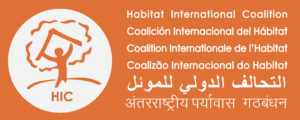
HIC GS
9 April (Avril) 2020

